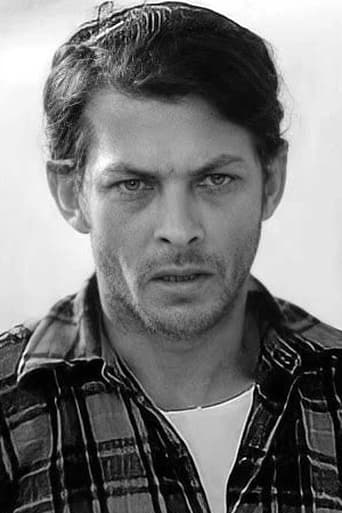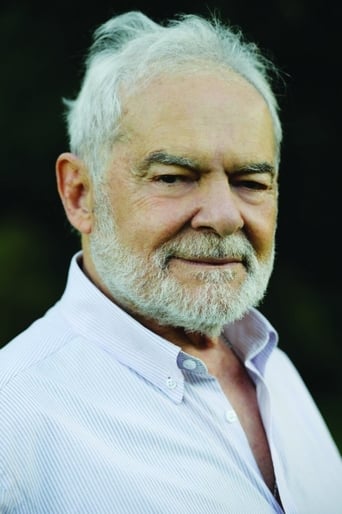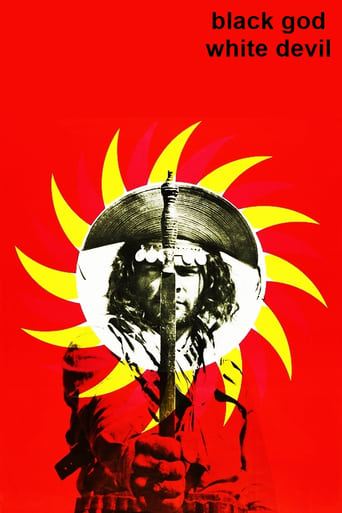
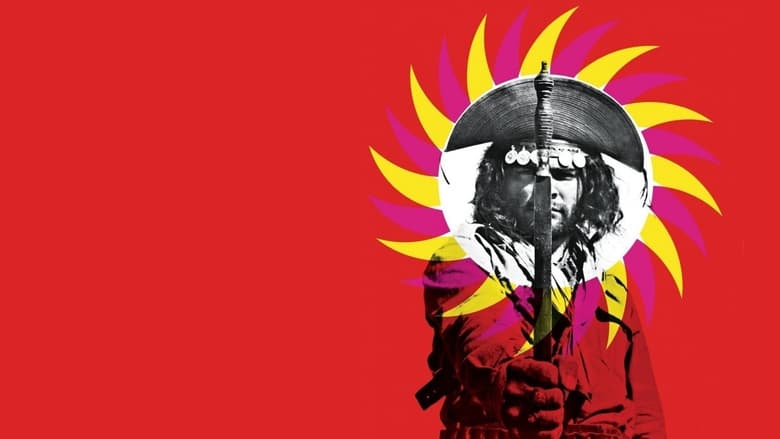
Black God, White Devil (2023)
Wanted for killing his boss, Manuel flees with his wife Rosa to the sertão, the barren landscape of Northern Brazil. Thrust into a primordial violent region, Manuel and Rosa come under the influence and control of a series of frightening figures.
Watch Trailer
Cast
Similar titles
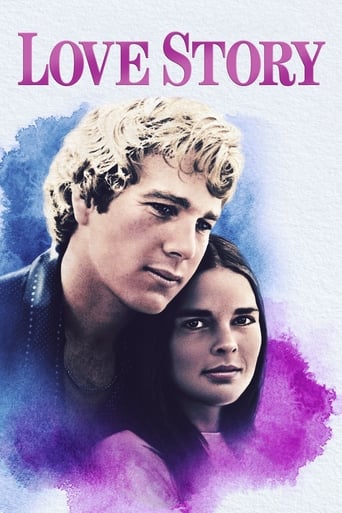
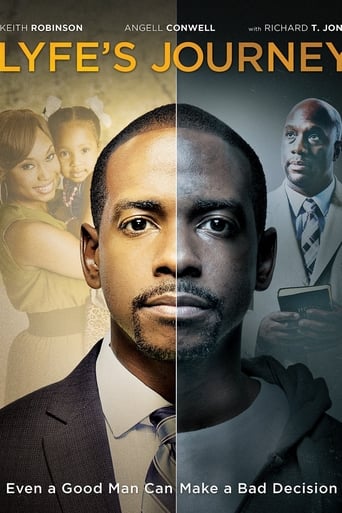
Reviews
You won't be disappointed!
There is, somehow, an interesting story here, as well as some good acting. There are also some good scenes
The movie turns out to be a little better than the average. Starting from a romantic formula often seen in the cinema, it ends in the most predictable (and somewhat bland) way.
By the time the dramatic fireworks start popping off, each one feels earned.
I kept thinking about Black God, White Devil but I couldn't gathered the right thoughts on it at first. For me discovering this film makes clearer the way Brazilian Cinema has become one of the most prolific and true to its own context cinemas in the world. I really believe that once an art manages to emancipate from the chains of the mainstream culture begins an honest art-form that is difficult to evade. I must admit that I had to pause the film in order to get some of the terms used trying to get the most from it. I had issues with the ample of the religious themes, but being from México another country in Latin America that has its history re-written in clerical ink gives me the notion the manner in which catholicism has permeated the Latin American countries' culture, and how was set to control the mind and acts! of the oppressed.The very first shots are overwhelming, we're being forced to grasp the world of the common folk, the amount of work to produce food for a day. To truly know these people's town through their quests, to learn about their struggle with corruption, fake prophets and their search for purpose, or simply a different life. The narrative is quite beautiful put, like a modest parable presents the story of Manoel who after killing his dishonest boss leave his home with Rosa, in his search for peace and justice stumbles upon with two different forces, the first from the "realm of god", a leader who promises a land full of everything the sertão is lacking, but the cost to it includes acts of utter violence; the second one offering to fight the system but with no honor, both asking for blind obedience and servitude. In the middle is Rosa, the voice of reason that we rarely give the credit deserved. The arc of Manoel and Rosa ends just how it began with they leaving behind everything they know, everything we came to know, with nothing but uncertainty about their future. Perhaps that's the commentary Rocha is offering us, that in a putrid system it is no good to trust rigid and tyrannical figures, and sometimes that in which we attribute power is leaving us empty.For me the cinematography felt as a part of the narrative, the overexposed takes are fascinating, the contrast between black and whites makes you feel the rawness of that arid space the characters are into. Perhaps is not a film for everybody not because the author made the effort to distance its oeuvre for a 'type of moviegoers' conceivably it has more to do with how we're used to learn only about our own struggles without reaching beyond the familiar, if you choose to ignore the history of other countries and detach yourself from their struggle surely you'll find this film 'boring', I think is time to learn about each other and be sensible about it.
I loved the first two-thirds of this jaw-dropping epic. For my second viewing, this time with a friend, we both agreed that it fell to pieces after that point, becoming incoherent and unfathomable, whilst still being stylish and remaining 'strange'.The visual sense was part 'Aguirre, Wrath of God' and Sergio Leone's 'Once Upon a Time in the West'. But, in grainy, high contrast black & white. Camera movements are urgent rather than flowing with the odd editing flourish to enliven the action. We both found this approach initially utterly mesmerising.This film is of hardcore fanaticism, with religious bigotry and the sheer survival in the harsh scrub desert-lands of northern Brazil. Some scenes are reminiscent of Russian cinematic masterpieces by Eisentstein, as in Ivan the Terrible. I think some scenes will offend and appal many viewers whilst still retaining mystery and that 'Wow, this is something totally different and exciting'. The sort of film that has the critics swooning but with the actual film-lover rather less than overawed. I'd rather not go into all the narrative in and outs, mostly because it is the overall effect and impression that it has left on me. Unforgettable, true; daring and significant, undoubtedly. But that doesn't make it a film any easier to watch, though. I would give the first two thirds 9/10 and the remainder five.
"So I've told you a story/of truth and imagination/I hope you've learned the lesson/and see this world is unjustly divided/for the land belongs to man/not to God nor to the Devil". Thus sings the narrator of Glauber Rocha's astonishing, symphonic, revolutionary epic masterpiece that changed Brazilian cinema overnight, was enthusiastically praised by great international filmmakers (Buñuel, Pasolini, Bertolucci, Godard, Leone) and stormed Cannes in 1964. Glauber, just 23 at the time of filming, combines a wide range of influences (Eisenstein, Dovzhenko, Humberto Mauro, John Ford, Welles, Rossellini, cinema-vérité, Godard, Buñuel, Brecht, Marx, Frantz Fanon, Guimarães Rosa, José Lins do Rego, Euclides da Cunha, Villa- Lobos, Portinari, Brazilian Art Brut and Northeastern popular culture) to achieve a poetic, explosive, entirely unique style that bombards the screen with unforgettable images, sounds and political significance."Truth and imagination" are the keywords to the film. Inspired by actual events ("truth") raised to almost mythological heights ("imagination") by Brazilian pamphlet literature ("literatura de cordel") and folklore, the film follows poor peasant cowherd Manuel and his wife Rosa in their dire saga through the Brazilian "sertão" (the arid hinterland in the Northeast of Brazil), and their encounters with "God" -- personified by black prophet Beato Sebastião (who turns out to be a messianic madman) -- and the many "Devils", personified by "Blond Devil" Corisco, the very last of the "cangaceiros" (heavily armed bandits who terrorized the "sertão" and became popular anti-heroes, not unlike U.S. Wild West bandits); Antonio das Mortes, the mercenary headhunter hired by local politicians and priests to kill Corisco; and Moraes, the cattle owner who, by humiliating Manuel, finally brings forth Manuel's tempestuous reaction and subsequent journey into crime, religious fanaticism, tragedy and final enlightenment.The highlights are countless: the film's opening shots, with the fly-infested carcasses of dead cows and horses out of thirst and famine under the blazing sun; the slow-paced depiction of Manuel+Rosa's lives in abject poverty, their hard and repetitive work, their endless struggle against hunger and inclement weather; the extraordinarily inventive sung narration, in the style of the "cantadores" (minstrels) of the "sertão", setting all the action in motion and commenting on it; the electrifying montage of the Monte Santo massacre, a tribute to Einsenstein's iconic Odessa steps scene in "Potemkim", and just as riveting; the Monte Santo chapel sequence, as Manuel kills an innocent baby in ritual sacrifice only to suddenly realize the horror of blind religious fanaticism; Beato Sebastião, fatally stabbed by Rosa, deliriously crawling on the altar's big crucifix as he tries to place himself on the cross as a new Messiah; the expressionist scene where the shadows of Rosa's knife and Antonio das Mortes' rifle "touch" on the chapel wall, marking the birth of a new, doomed pact of blood and death; Villa-Lobos' famous Bachianas #5 vocalise dictating the pace of Corisco+Rosa's passionate kiss while the camera draws frantic circles around them; the Buñuelian power of the sequence where the wedding party turns into a nightmarish terror of merciless torture and rape.There's much more: Othon Bastos's amazing performance as Corisco, with his electric, restless body movements and thunderous voice ("Corisco" means lightning in Portuguese). There's a staggeringly bold conception in the scene -- partly influenced by Kurosawa's Rashomon and partly by the trance tradition of Afro-Brazilian religions -- where Corisco suddenly "incorporates" the spirit of dead bandit Lampião, aka the "king of the cangaceiros": Bastos' voice lowers, his gestures become hieratic, the camera frames just half of his head in extreme close-up (the "split" personality), alternating with close-ups of the emblematic elements of his "cangaceiro" outfit, where bullets, crucifixes, silver coins, guns and amulets co-exist, representing religious faith, ostentation, superstition, vanity and thirst for blood. Observe the way Glauber "arranges" his characters on screen: they always move "magnetically" toward other characters with whom they identify at given moments; it's a Brechtian, choreographic mise-en-scène in a completely non-theatrical environment (the vast openness of the sertão!). Waldemar Lima's weightless, dizzying camera and high-contrast lighting is essential to the film's aesthetics, as is Sérgio Ricardo's voice and guitar-playing as the narrating minstrel, Rafael Valverde's virtuoso, multi-style editing and the unique locations in the hinterland of Bahia.I could go on and on; it's such a rich film that multiple viewings are required, culminating in the breathtaking finale of unforgettable poetic and political impact. Building a realist/expressionist/ mythological portrayal of Brazilian sertão -- the inhuman labor and life condition of the illiterate, destitute, God-fearing peasants, perennially exploited by landowners, politicians, bandits, Catholic priests and doomsday messianic "prophets" -- Glauber proposed a "new Brazilian cinema" for a new Brazil, less ignorant, less corrupt, less unequal, less exploitative. A country where land could finally belong to Man, not to God nor to the Devil. Rocha's ambitious dream was traumatically excised by the Brazilian military coup of 1964, that buried all hopes of a long-awaited and much-hailed political and agrarian reform that ultimately caused the deposition (with the CIA's active help) of left-wing President João Goulart. But this incendiary, revolutionary, poetic manifesto influenced a whole generation and is still dazzling enough to keep inspiring filmmakers and audiences whose blood boils for socially-aware films that are also non-conformist works of art. A masterpiece.
Deus e o Diabo na Terra do Sol isn't just a good Brazilian movie. This is an actual masterpiece, compared to the big ones in the history of cinema. It's not a boring and too regional film, but deals with universal aspects of human nature, such as blind devotion, love, hate, and all kinds of misery. Glauber Rocha, with only 22 years, made a mix of Eisenstein, Italian neo-realism and nouvelle-vague, under a background of cordel literature (our pulp fictions). The Mauricio do Valle character, Antonio das Mortes, is fundamentally a European western anti-hero, and certainly inspired Leone, Corbucci and others in the development of their scripts. The soundtrack, with Villa Lobbos and Rocha&Ricardo songs, matches perfectly with the dry landscape of the Brazilian Northeast. In short, Deus e o Diabo na Terra do Sol must be known. If you have open mind and like great cinema, and not just the popcorn no-brain north-American blockbusters, try this one.
